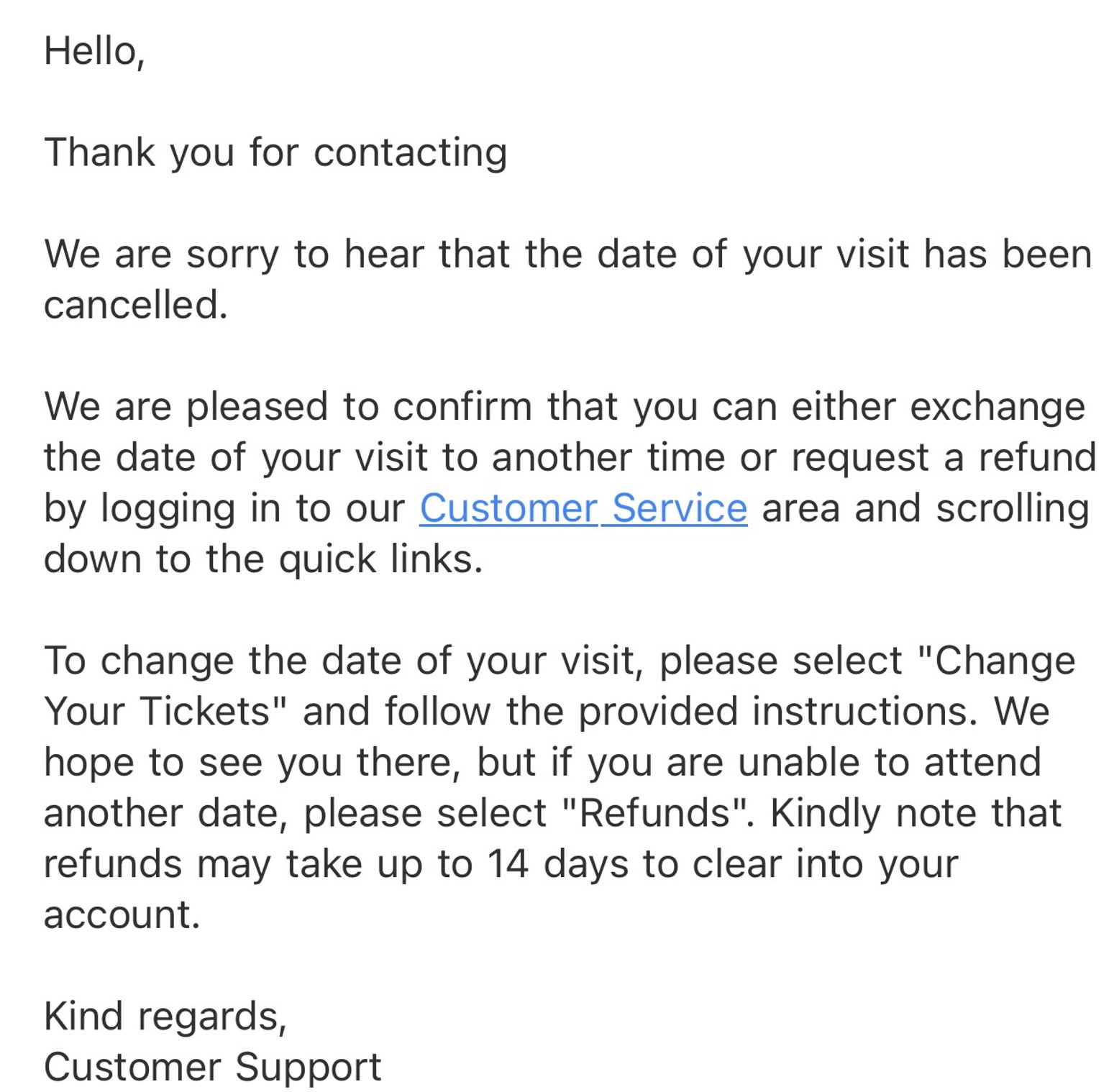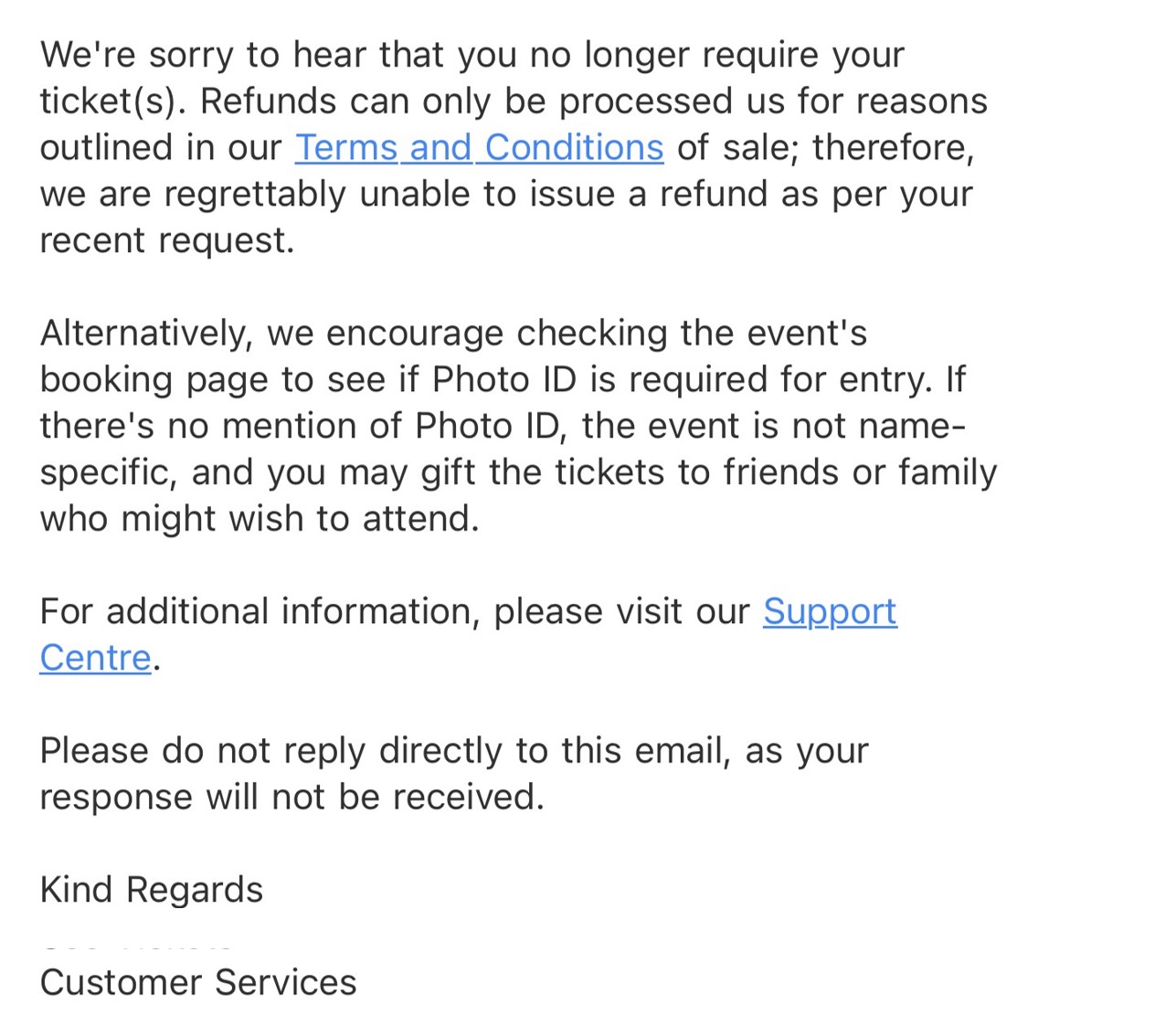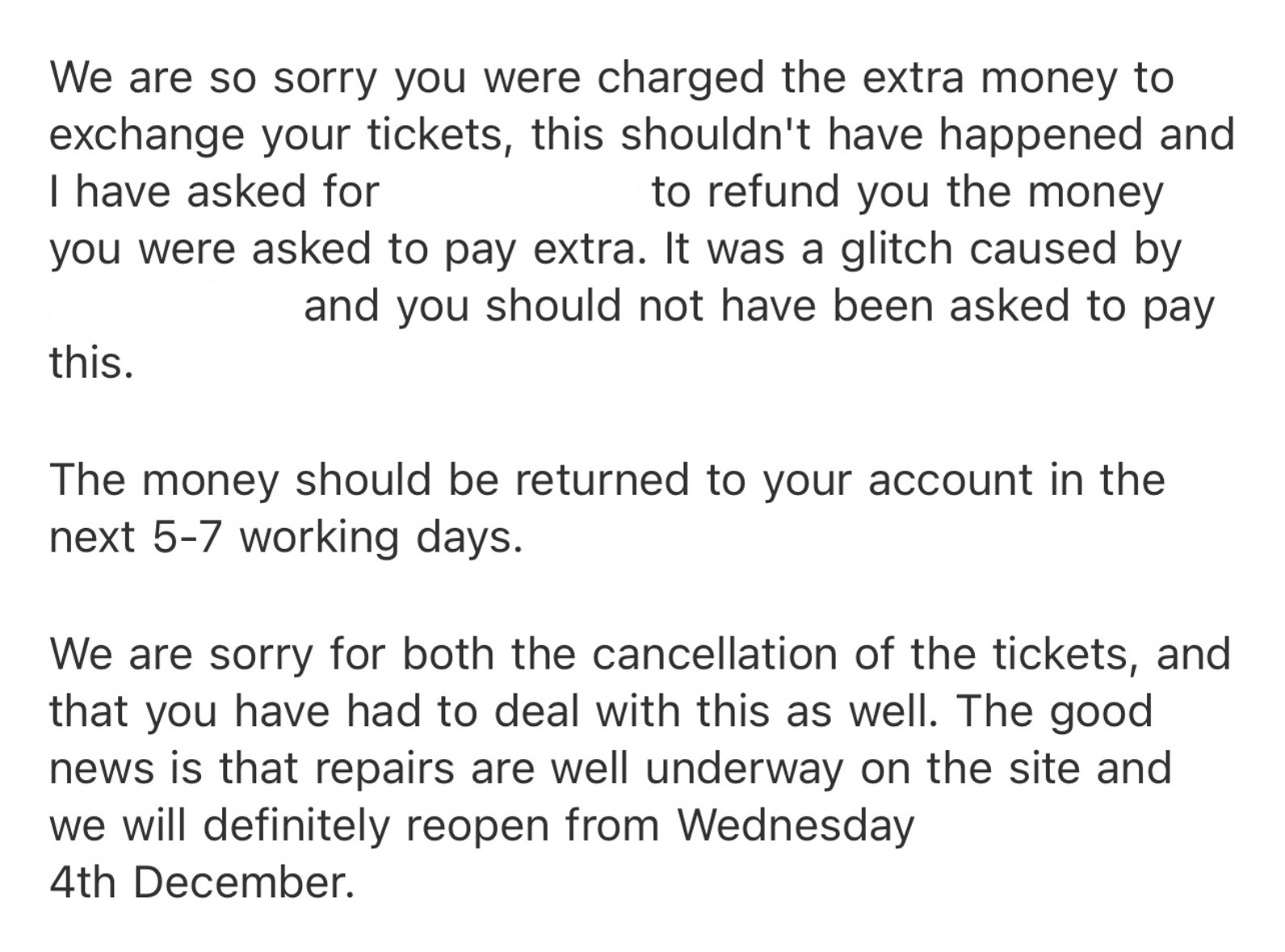Hooray for Humanity!
4 December 2024
I kicked myself about how I ended my last, more lighthearted, “Angry Lemons” blog because I missed a really obvious loop back to why protecting the humanity of our expressions, emotions and our empathy are all so powerful within the world of service. You know, an opportunity to connect my rambles to actual BUSINESS and my key area of expertise?! (doh!) So let me right this wrong in my efforts this month and pick up from last month’s missive, illustrating my point with an example from a recent service experience, yes, it’s another story about ticket purchasing. Hooray!
I am partial to events. Both in work as a connector of people and enabler of impact, and in my personal life (The memories! The Instagram opportunities!) Halloween extravaganzas, Santa experiences, the list of planned fun activities is endless, so it will come as no surprise to you that we had booked to visit the Christmas light trail in Cardiff. I fully appreciate how lucky we are that I’m able to do these things. I know that not everyone is able to.
The devastating flooding that South Wales has recently experienced had also affected this event unfortunately, so we received an email from the ticket provider explaining that our forthcoming visit could not proceed as they needed to clean up the site, but by clicking the link provided you could rebook.
My husband clicked the link and then tried to rebook for the next weekend that my stepdaughter was coming to stay (two weeks later) on the same day of the week, same time, but now, it was going to cost us £7 extra (this included ANOTHER transaction fee by the way … grrr).
Sarah “I know my rights” Lethbridge began to stir from the sofa.
“That can’t be right? Let me have a look”. Snatches phone from husband to start investigating. After some extensive clicking and exploratory navigation, I concluded that there was no way that we could rebook without paying the £7.
“Just pay it and I’ll complain and ask for a refund for the difference”.
With the incessant pulse of consumer injustice coursing through my veins, I picked up my laptop and then began to attempt to find an email address for the ticket provider to request the return of our £7.
Reader, I COULD NOT FIND ONE. My “beautiful service experience” spidey senses started twitching in the knowledge that the last of Lou Downe’s “Good Services” manifesto, point 15, is “make it easy to get human assistance”.
They had obviously not read the book.
There then followed complex navigation through their portal which required “requests to access your order” to be able to ask them any questions about your purchase. I click and click and clicked and finally got to a point where I could send a message.
I would share what I wrote with you but I can’t because I have no ability to see what I wrote anywhere. It has disappeared into a customer care phantom zone. It was basically ‘CAN WE HAVE OUR £7 BACK PLEASE?’, put better.
To which we received this reply the next day, from a ‘no reply’ email.

Err, pardon? Did you read what I wrote? Your reply has no seeming connection to the message I sent you which clearly articulated our issue and simply asked for the difference between the two costs?
I SMELL BOT.
Furious, I click, click, clicked, “requested to access my order”, click, click, clicked, before I composed, in a tone that can only be described as ‘terse’, another request for the refund of the £7, which, a day later, triggered this message.

WHAT!? I JUST WANT THE DIFFERENCE IN PRICE BACK! Interestingly, this reply appeared to be from ‘Customer Services’ as opposed to the previous ‘Customer Support’ team (both teams partial to the most irritating email close of all time “Kind Regards” as well as both using a ‘no reply’ email address – the sure sign of a service that doesn’t really care).
But wasn’t this reply just automated too as it seemingly paid no attention to anything that I said? Were there really two teams or is this just how the algorithm responds when the system knows this is my second attempt?
Urgh. This wasn’t working. I needed a new angle. I turned to Facebook to see if anyone else was having the same difficulties. To my surprise they weren’t, but a customer had reached out to ask if they could swap times to which someone kindly replied in the affirmative, supplying an email address to the actual event team. This address began with a perky “hello@”. Joy! No sign of a ‘donotreply@’ anywhere. I breathed a sigh of relief. This is who I needed to direct my request to.
I conveyed our plight and received the following delightful reply.

A HUMAN! WHO HELPED! HOORAY! The confidence and warmth that I had experienced in anticipation of the event, that the re-booking experience had eroded, began to gently glimmer and reemerge. The money reappeared in our account in 3 different transactions, which all amounted to £7, but made me think that it wasn’t easy for someone to refund us the difference and that some kind of ‘fix’ had to have been applied. Regardless, the £7 had rightfully been returned and I had notched up another successful consumer conquest!
But I wonder how many people just accepted the increase in price. I wonder how many people gave up at the first attempt to ask for the price difference back. I wonder how many people gave up at the second. Not everyone is as determined as me. I know this.
I know amazing services. I know what they can provide organisations. The customer loyalty, the consequent ability for growth, the beautiful connection between service excellence and organisational innovation (I should write more on this) and in lots of our services, we do have choice. We can think to ourselves “That was awful, I’m never going to use them again”, switch provider, tell our friends, write a blog about the experience, but the problem with lots of our commercial service expenditure is that we don’t have any choice. (I am absolutely not suggesting that public services should be turned into commercially competitive choicefests by the way, we just need public services (and I count things like trains, electricity, water, healthcare etc as a public service) to just work and be the best that they can be. Here, I’m talking about commercial services where we absolutely should have a choice.)
If we wanted to go to that event, we had to buy the tickets with that provider. That’s why they can use ‘donotreply’ emails when they respond to customer contact in a way that completely ignores what the customer has asked of them. I don’t know what I can suggest which might encourage them to adopt a different approach which has obviously been introduced to reduce the need for employing staff and hence lower costs. They don’t have to do anything I suggest because they have all the power. My only hope is that maybe the event organisers consider using a different vendor in the future I guess?
What I do know is that where we do have the power within the services that we run, we must remember that humans ultimately want to interact with other humans. I don’t mind interacting with a bot if it listens, helps me and doesn’t try to pretend that it’s a human, we know AI is good and getting better and better and better, but when it can’t help, please, PLEASE, let me talk to another human being and let them have the autonomy to empathise with my plight, and critically, let them have the tools and jurisdiction they need to be able to help me out.
As John Seddon would advocate, we need to design services that absorb variety, and the best way to do that is to best equip the front line of the service to listen, care, and be able to take appropriate action. And that’s what humans are brilliant at. Well, most of them.
- Working Smarter and Harder to Overcome Friction
- Mesmerising Mnemonics
- Recharging Batteries
- Marketing Magic
- What’s My Job Again?
- The Reports Have Gone to Her Head
- Cross Stitch Standards and Creativity
- Hefin David and the Aeroplane Arms
- Hankering for a Handbook
- Window of Light
- Defensive Organising
- McMullin’s Tandem of Co-Production
- The Joy of John Parry-Jones
- The Perils of Disappointment
- The Shield of Shame
- Customer Care and Organisation Innovation
- Hooray for Humanity!
- Angry Lemons
- Double Meanings
- Ticketing Masterplans
- When will it all end …
- Lifetime Loyalty and Taylor Swift
- Looking at Things Differently
- Networking Noodles
- Addicted to Truth
- Designs on Service Design
- The Multiple Joys of Universal Design
- Hungry Cultures
- Event Lean
- The Traffic Analogy
- Moving on Up
- Rosé Cava Revolution?
- Powerpoint Sneaky Lean
- Writing about Writing
- ChatGPT Response: Exploring the Art of Expression: Unveiling the Magic of Writing in the Style of Sarah Lethbridge
- Help to Grow Coldplay Style
- Caring IS Everything!
- Institutional Flapping
- “Just Do the Next Right Thing”
- Trust Thermoclines
- February 2026 (2)
- December 2025 (1)
- November 2025 (1)
- October 2025 (2)
- September 2025 (1)
- August 2025 (2)
- July 2025 (1)
- June 2025 (1)
- April 2025 (1)
- March 2025 (2)
- February 2025 (1)
- January 2025 (1)
- December 2024 (1)
- November 2024 (1)
- October 2024 (1)
- September 2024 (1)
- July 2024 (2)
- June 2024 (1)
- May 2024 (1)
- March 2024 (1)
- February 2024 (2)
- December 2023 (2)
- October 2023 (2)
- September 2023 (1)
- July 2023 (3)
- June 2023 (1)
- May 2023 (1)
- April 2023 (1)
- March 2023 (1)
- February 2023 (1)
- January 2023 (1)
- November 2022 (1)
- October 2022 (2)
- August 2022 (2)
- July 2022 (1)
- May 2022 (2)
- April 2022 (1)
- February 2022 (1)
- January 2022 (1)
- December 2021 (2)
- November 2021 (1)
- October 2021 (1)
- September 2021 (1)
- August 2021 (1)
- July 2021 (1)
- May 2021 (2)
- April 2021 (1)
- March 2021 (1)
- January 2021 (1)
- December 2020 (1)
- October 2020 (3)
- August 2020 (1)
- June 2020 (2)
- April 2020 (1)
- March 2020 (1)
- February 2020 (1)
- December 2019 (2)
- October 2019 (1)
- September 2019 (1)
- August 2019 (1)
- July 2019 (1)
- June 2019 (1)
- February 2019 (3)
- October 2018 (1)
- September 2018 (1)
- March 2018 (10)
- April 2016 (1)
- January 2015 (3)
- July 2014 (9)
- September 2013 (1)
